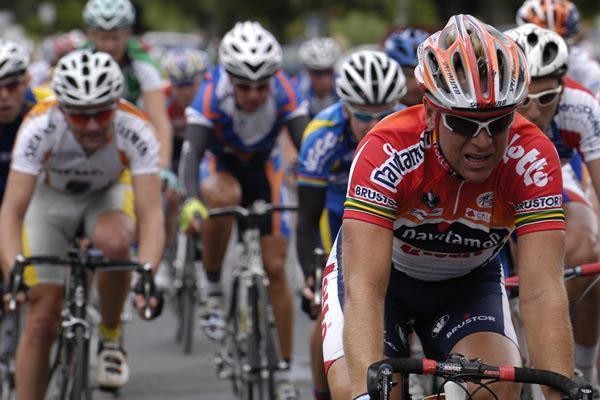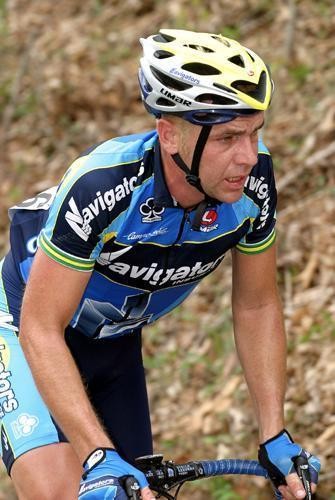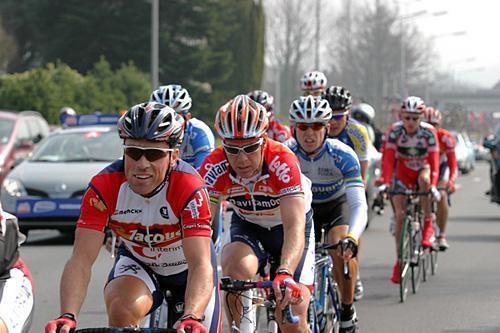Coming full circle: Part II
In part two of this interview, Vogels speaks about the effect of the ProTour on the early season...



An interview with Henk Vogels, April 9, 2005
In part two of this interview, Vogels speaks about the effect of the ProTour on the early season races and being a little underdone himself, his impressions of the 2005 parcours, the contenders, the weather, and what it takes to win the Hell of the North. Click here to return to Part I.
Cyclingnews: You mentioned you've had a low-key start to the season, and that you're a little underdone in terms of the racing, but talking about the early season, races seem to get harder and faster as each year progresses; how have you found it?
Henk Vogels: Having had you said that, I think the ProTour has had an effect on races up north - meaning the northern Classics like Kuurne-Brussels-Kuurne, Three Days of De Panne, Gent-Wevelgem and Tour of Flanders... I think it's changed a little bit.
I mean, having two Spanish riders away in the Tour of Flanders with some 25 kilometres to go was just incredible. The Belgian commentators used to laugh at the Spanish riders at the back of the bunch at the foot of the Molenberg, because they didn't know the roads, but the Spanish and Italians are really having a go this year - especially guys like [Juan Antonio] Flecha, though he's always been quite good and really seems to enjoy the northern Classics. The ProTour also seems to changed the lead-up races - I mean, Liberty Seguros and Illes Balears rode GP Cerami yesterday, and I would definitely have to say that they're chasing ProTour points.
CN: Towards the end of March you rode races like Dwars door Vlaanderen, E3 Prijs and Brabantse Pijl to prepare yourself for races like Wevelgem and Roubaix. You were solid but not super in those races, but could you feel your form picking up after each event?
HV: Well, in Kuurne-Brussels-Kuurne, I was only about 100 metres off the front group on the Oude Kwaremont. There was a group of four or five of us and we swapped off and got on about 25 kilometres later - I was a little bit done by the time we got there, but at that stage, there was eight Davitamon-Lotto riders in the first group of 25 or 30 - that was just an indication that I had a pretty good winter and I had done well, so I can only see it going up from here.
Get The Leadout Newsletter
The latest race content, interviews, features, reviews and expert buying guides, direct to your inbox!
But having said that, you can never say you're going to ride well - that goes with the territory, unfortunately! [half-laughs] Like I said, I had quite an average lead-up after the crash in Harelbeke and not having a suitable programme, but in another respect, I don't feel thrashed; I feel ready to race now, which fares well for my programme. Scheldeprijs is a huge race in Belgium, also Frankfurt is a huge race, and, well, then it's the Giro.
That's one of the reasons why I'm here, someone with a bit of speed to help McEwen in the final. Petacchi won God knows how many stages last year [nine-Ed], so hopefully we can do a bit better this year with Steels and myself helping Robbie, or me and Robbie helping Steels - it's going to be interesting.
CN: Speaking about Roubaix, you mentioned the removal of the Arenberg Forest in this year's edition will make things as if not more difficult than before, but do you think it will change the face of the race, in terms of how the race unfolds, given Arenberg is invariably where the first split occurs?
HV: I actually think Arenberg is ridiculous, because it actually doesn't show the real form of the rider; I think Arenberg is like a tree standing in the middle of a descent - it's just something you have to avoid. Guys like Museeuw broke their leg sprinting into the Arenberg Forest... I mean, there were lead-out trains going into the Arenberg Forest last time I did it.
When I rode the new sections this morning, I thought it's going to make the race better. The climb is going to sort the field out more naturally than say, the Arenberg, where guys are falling over because it's so bad, and the media are actually waiting for a crash. You know with the history of my falls, I don't want to see anyone crash.
Sunday, they're forecasting bad weather and there are some bad sections in the changed part of the race, so you are going to see some crashes - it just goes with the territory. In forgetting Arenberg, I think it's made the race better, and I think they've made a good decision in going that way. [The changes] will make the race harder; there are sections which are vicious and the climbs - but that I mean small rises in the roads that when you're on cobbles, feel like mountains - in between sections are going to sort things out, too. The telly [television] will show who the strongest rider is on Sunday, and no matter what, barring falls, the strongest rider will win.
CN: You said you rode 70k of the course this morning; have you ridden any more of the parcours earlier in the week, and if so, what are your impressions?
HV: I haven't ridden any other sections since 1999. I've ridden Paris-Roubaix three times; the first two times I was 10th, and the next time I think I was 46th with Credit Agricole, when I was national champion that year. I haven't done any other reconnaissance, but I've been studying the books pretty closely. Really, knowing the new sections is probably the most important thing regarding the race; the rest is all up to you - having the power to fly over the stones, being smart and experience is really what you need in this race.
Knowing a course like the Tour of Flanders is probably more important than say, Paris-Roubaix; [in Roubaix], you know it's flat, you know the stones hurt, so it's about riding a straight line and follow the wheel, whereas in the Tour of Flanders, you need to be at the front at certain corners and certain times of the race. That's what the Belgians specialise in up here, and that's what the Spanish specialise down in Spain; it's just one of those things.
CN: Your team goes into the race with two leaders in Van Petegem and Mattan, but yourself, Tom Steels and Leon Van Bon can also do good rides. So how will your team play it on Sunday?
HV: You know what? We really haven't had a deep discussion about that - we all know who the number one is, but like you said, there are a number of other roles. Tom Steels has just come into some really good form at the moment - he's a dangerous rider to have up the road, and he's getting better day by day after his sickness; Leon Van Bon has been so close for so many years and is a cobbles specialist; Bert Roesems came up in the same generation as Tom Boonen and is also someone who is very strong at the moment as well; and Aart Vierhouten is also quite good.
But I really don't know at the moment; it's a matter of having someone in the breakaway, and after that, it's a matter of being in the front, being in contention when the moves are going. Guys who are good will be there and guys who aren't won't be. As far as our team is concerned, we really haven't had a team meeting, but it's stock standard at Paris-Roubaix - stay in the front.
CN: Are there any other contenders in your mind besides Boonen, Van Petegem, Mattan, and Zabel?
HV: The absolute favourite is Magnus Backstedt - he's the number one favourite in my mind. George Hincapie I think will be awesome; he was probably not as good as other years in Flanders, but still very, very good. Roger Hammond had a crash in Gent-Wevelgem - I don't know the status of that, but that is a huge blow for Discovery. Max Van Heeswijk is normally very good, but he is out because he's sick, so Discovery are a little bit weakened. Though Stijn Devolder has had super form since early March - it hasn't eluded him yet, so he's definitely going to be someone to watch - he's an incredible talent and will be someone to watch for the next 10 years in races like this.
I think Fassa Bortolo will be one of the strongest teams in the race, if not the most complete team. Liquigas will be riding for Backstedt all day, and he'll have seven riders just for him. Also, Quick.Step has seen to be one of the strongest Classics teams in the world; as far as the other Belgian teams, Chocolade Jacques have a couple of good riders, and Ludovic Capelle always seems to have a good ride here. Frank Vandenbroucke won't be anywhere.
CN: Apparently, his aim is to ride to the feed zone...
HV: You never know with Frank - he keeps the media stunned! (laughs) But it's wide open; you know who the Classics guys are from the last month, so you can take your pick out of about 20 guys. Wevelgem is usually a good indication of who will go well in Roubaix, so any one of those guys that can ride in the front in Gent-Wevelgem can certainly ride in the front in Roubaix.
CN: It's pretty hard to talk about Roubaix without talking about the weather, and like you said, it's predicted to be cold, wet and windy on Sunday, a max of 10 degrees and a wind from the northwest? How does that suit you?
HV: To tell you the truth, I would prefer a dry, safe race. But there's no way that's going to happen, because it's going to be pissing down rain the next 24 hours... no matter if there isn't one drop of rain in that six and a half hour race, the cobbles are going to be very muddy, and the cars and the motorbikes and going to be driving over them before the riders do, so they'll be splashing mud and dirt everywhere.
There are some very dangerous sections, and for sure there will be a lot of crashes. [The weather] does make it harder - there are a couple of smaller descents with corners, and if they're wet, you're going to see some guys go down. Having said that, if it was dry and fast, I don't think it would change the result too much apart from the crashes. Definitely, a wet, windy, cold day in hell is what's going to happen on Sunday, no matter what. Even if you're the winner, it's going to be hell - it's just going to be one of those days where you're going to get off the bike and pray for a hot pizza and a warm beer... preferably a Leffe Blonde! (laughs)
CN: Speaking about those in contention to win the race, is Roubaix a better race for the contenders when the weather is bad?
HV: Well... Jesus, I really don't know, I really don't know. To sum it up, it's going to be a classic, something like when [Andrei] Tchmil won in 1994 - you're going to see a similar day to that. I think it's going to be split more than other years and the changes they've made, they've made this race much harder. The added sections and the added climb on the cobbles, I think is still 95 kilometres to go till the finish - so it's going to break and come back, and break and come back. But I really couldn't answer that question.
CN: You mentioned doing a few more Classics-style races after the Roubaix before leading up to the Giro; have you any plans past that point?
HV: Yeah, if all goes well, and I'm not completely knackered after the Giro, I'm going to fly directly from Milan to do Trenton and Philadelphia. Fred Rodriguez wants to win the national championships there and hopefully I can help him do that; there's also a personal ambition for that race - it's just an amazing race and also one of the best races in the world to be good at. If I can come out of a three-week Tour and have five or six days' rest, you could see a good performance there, too.
Hopefully, I'll shut it down after that. At the moment, I'm not planning on doing the Tour de France - I'm planning on coming back [to Australia], see my two boys and my wife and spend some time in Australia. Then come back for the August classics and the world championships in Madrid.
CN: Sounds like a good plan. Have a great day in hell, Henk!
HV: Thanks mate. I just want to let you know I'm enjoying it, even though it's going to be a day in hell on Sunday. Having come back from a near career-ending crash, back into a ProTour team, one of the best Classics teams in the world, it's going to be a great feeling lining up at the start on Sunday morning. It's exciting for me.